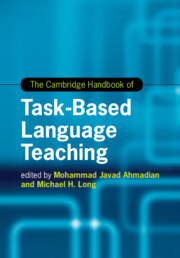Book contents
- The Cambridge Handbook of Task-Based Language Teaching
- Cambridge Handbooks In Language And Linguistics
- The Cambridge Handbook of Task-Based Language Teaching
- Copyright page
- Dedication
- Contents
- Figures
- Tables
- Contributors
- Preface The Origins and Growth of Task-Based Language Teaching
- Part I The Rationale for Task-Based Language Teaching
- Part II Tasks and Needs Analysis
- Part III The Task Syllabus and Materials
- 6 The Cognition Hypothesis, the Triadic Componential Framework and the SSARC Model
- 7 From Needs Analysis to Task Selection, Design, and Sequencing
- 7A Task-Based Telecollaborative Exchanges between US and Italian Students
- 8 Exploring the Nuts and Bolts of Task Design
- 8A Designing Pedagogic Tasks for Refugees Learning English to Enter Universities in the Netherlands
- Part IV Methodology and Pedagogy
- Part V Task-Based Language Teaching with School-Age Children
- Part VI The Teacher in Task-Based Language Teaching
- Part VII Task-Based Assessment and Program Evaluation
- Part VIII Research Needs and Future Prospects
- Index
- References
8 - Exploring the Nuts and Bolts of Task Design
from Part III - The Task Syllabus and Materials
Published online by Cambridge University Press: 19 November 2021
- The Cambridge Handbook of Task-Based Language Teaching
- Cambridge Handbooks In Language And Linguistics
- The Cambridge Handbook of Task-Based Language Teaching
- Copyright page
- Dedication
- Contents
- Figures
- Tables
- Contributors
- Preface The Origins and Growth of Task-Based Language Teaching
- Part I The Rationale for Task-Based Language Teaching
- Part II Tasks and Needs Analysis
- Part III The Task Syllabus and Materials
- 6 The Cognition Hypothesis, the Triadic Componential Framework and the SSARC Model
- 7 From Needs Analysis to Task Selection, Design, and Sequencing
- 7A Task-Based Telecollaborative Exchanges between US and Italian Students
- 8 Exploring the Nuts and Bolts of Task Design
- 8A Designing Pedagogic Tasks for Refugees Learning English to Enter Universities in the Netherlands
- Part IV Methodology and Pedagogy
- Part V Task-Based Language Teaching with School-Age Children
- Part VI The Teacher in Task-Based Language Teaching
- Part VII Task-Based Assessment and Program Evaluation
- Part VIII Research Needs and Future Prospects
- Index
- References
Summary
This chapter presents two complementary sets of parameters for task design. These are contextualized within a dynamic collaborative process involving designers, teachers and learners, requiring both specialist knowledge, and specialist skill. To illustrate, we draw on accumulated insights from a range of empirical studies, including research into learner performance on tasks, research into the process of design, and classroom studies of teachers and learners working with tasks. We highlight relationships between design and implementation, and tensions between the task ‘on paper’ and what happens in the classroom, suggesting ways of addressing these through the preparation for task design that teachers might receive.
Keywords
- Type
- Chapter
- Information
- The Cambridge Handbook of Task-Based Language Teaching , pp. 262 - 289Publisher: Cambridge University PressPrint publication year: 2021

